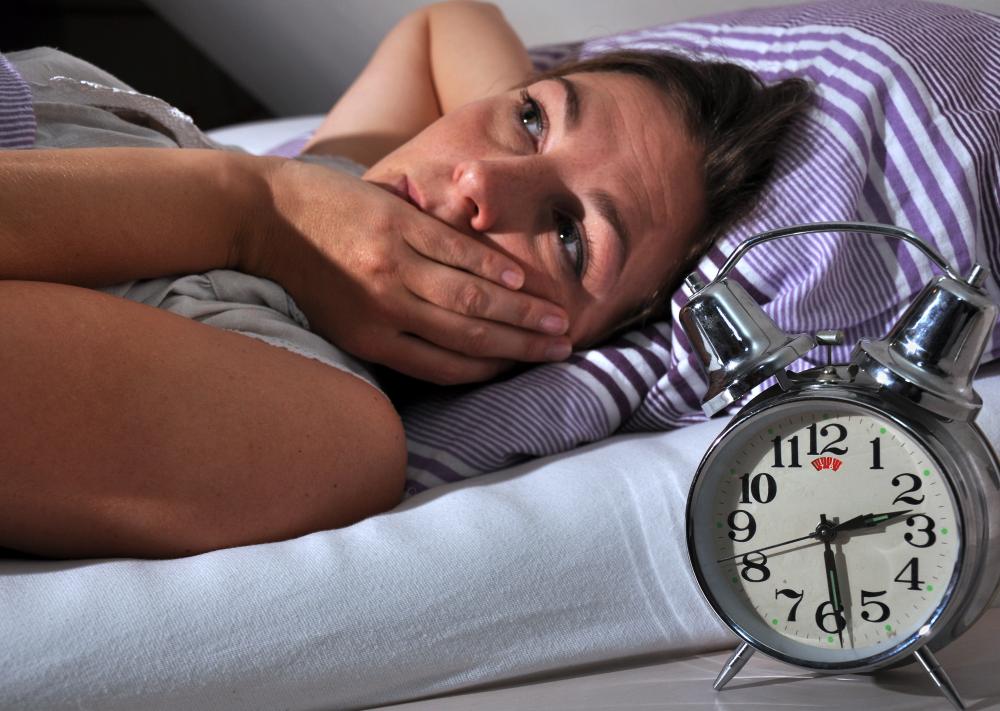At WiseGEEK, we're committed to delivering accurate, trustworthy information. Our expert-authored content is rigorously fact-checked and sourced from credible authorities. Discover how we uphold the highest standards in providing you with reliable knowledge.
What are Hypnotic Drugs?
Hypnotic drugs are those meant to cause sleepiness or promote calm, and they may also be called sedative hypnotic drugs. These medicines can vary to the degree they are effective and may also vary in the level of sedation or sleepiness they cause given dosage and individual patient response. Hypnotics come from many different types of drugs, and additionally, there are medications that have hypnotic or sedating effects, though their principal actions might address other conditions, like pain relief.
One of the big groups of hypnotics are medicines called benzodiazepines, such as diazepam, lorazepam, alprazolam, and clonazepam. These are usually used as anti-anxiety medications, but they also promote sleep when taken in directed amounts. Such medications have short half-lives, are notoriously addictive, and can be viewed as drugs of abuse. These downsides do not detract from the very positive benefits benzodiazepines may have, especially in the treatment of anxiety, and certain of them are also quite capable of stopping seizures in emergency settings.

Another group of drugs is called nonbenzodiazepines, and they are somewhat similar in structure to regular benzodiazepines. These medicines, like Ambien® and Lunesta®, do not seem to be as habit forming as drugs like alprazolam, and they’re used principally as hypnotics, to induce sleeping. They’re inappropriate for anxiety relief because they’re very effective in helping people to go to sleep and perhaps remain asleep.

An older class of hypnotics is barbiturates. These include medicines like phenobarbital. As with benzodiazepines, barbiturates can be addictive and they can be dangerous if overdose occurs. They also perform multiple functions, such as temporarily ending anxiety, causing sleep, or stopping seizures.
The last formal grouping of hypnotic drugs is those used in anesthesia. These may cause complete sleep without possibility of waking or remembering, or they promote conscious or waking sedation, where a person might remember a little bit. Sometimes dosage determines the level of “hypnosis” achieved.

Lots of other drugs can be considered hypnotic drugs. Many common antihistamines like diphenhydramine (Benadryl®) cause sleep or drowsiness. There are a variety of medicines used in pain relief, such as the opioids, that may make people feel sleepy or less anxious too. Certain street medicines are hypnotics; they may be rough copies of drugs available by prescription or they can actually be illegally sold prescription drugs.

There are so many hypnotic drugs that a general discussion of side effects would be difficult. A few hard and fast rules exist for how to treat these medicines. First take only what is individually prescribed and no more than told by a physician to take. Second, believe the labels about hypnotics promoting sleepiness, and avoid operating machinery, driving, or having to make important decisions while under the influence of one these drugs. Lastly, consider any drug or nutritional supplement that warns about sleepiness to be a “type” of hypnotic, and use it with care as to activity level and dosage.
AS FEATURED ON:
AS FEATURED ON:















Discussion Comments
All people are worried about now about now is addiction, blah blah blah. Whatever happened to having fun and enjoying life and expanding your mind?
Everyone has problems. everything is addictive. Going on your computer every day is addictive, watching TV, using cellphones.. Guess what? That's harmful in some way. People just need something to complain about and try to ruin people's fun.
Caffeine is addictive. When you stop drinking it, you're going to have headaches every day and you're going to feel sleepy.
It's funny. No matter how many of these posts I read, I never see Scopolamine mentioned. Maybe because it's hard to get, but that is a real hypno-drug.
Heroin is good for sleep but its hard to determine whether it's a good idea or not.
dependence on or addiction to ativan begins with about six weeks of regular use. Three years of consistent use well exceeds six weeks. You should research ativan, but be aware that cold turkey quitting is extremely dangerous, and consider meeting with a doctor to determine the risks of using other different medications.
My doctor prescribed 15mg of Qauzepam right before bedtime to treat my insomnia. It worked like a dream the first few nights but then I started waking up feeling dizzy with these terrible headaches that lasted all day. It felt like your worst hangover. I didn’t like that feeling so I stopped taking it.
A friend of mine told me about this hypnosis for sleep program that she says cured her insomnia. I can't wait to try it out. Listening to someone else telling me to go to sleep might actually work, since I tend to talk back to myself as to why I can't. And it can't possibly have the same side effects.
@whitesand: I’m sorry to hear about your mother’s loss. First of all, Ativan is a controlled substance with an addictive ability. Your mother should have been prescribed a very low dose since the effects can be very strong.
It can cause her depression to worsen and should only be prescribed if she’s already treating that depression with an antidepressant.
I think my mom might be addicted to Ativan. It was prescribed to her about 3 years ago after the death of her late husband. At first I had to take it away from her because she was totally dysfunctional. I found out the other day that she’s still taking the drug. She says it’s the only thing that calms her mind long enough to fall asleep at night.
What concerns me is the mixture of medications she’s taking. A few of her medical conditions are heart disease, high blood pressure, depression and thyroid problems. Does anyone know how safe this drug is? And is Ativan usually prescribed to fight insomnia with the elderly who have these kinds of medical conditions?
Post your comments